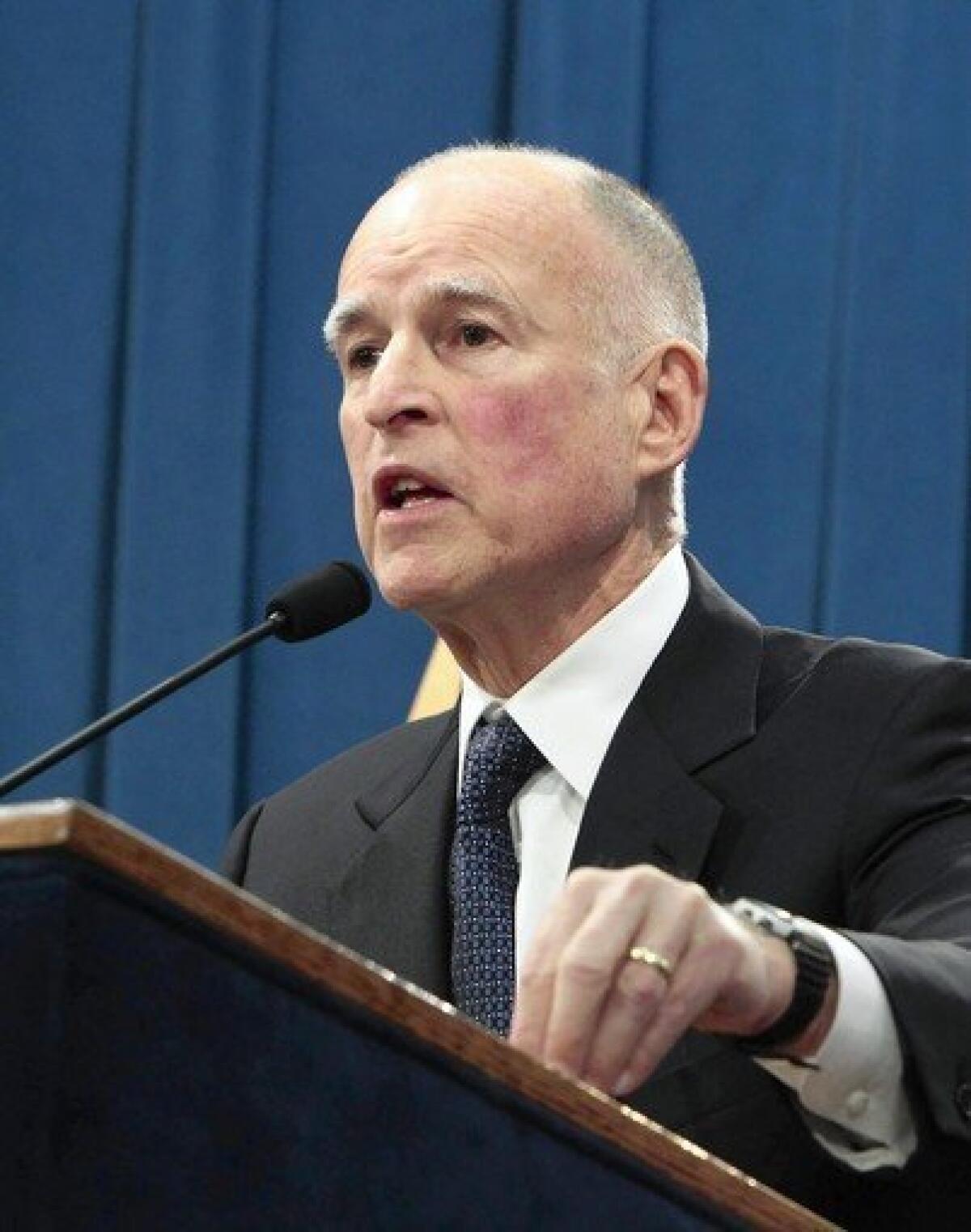Brown may forge alliance with GOP governors on health plan

SACRAMENTO — When Gov. Jerry Brown meets with the nation’s other governors this weekend in Washington, D.C., he will find common ground with some unlikely counterparts on an unlikely issue: President Obama’s healthcare plan.
Among the governors now moving nearly as aggressively as Brown to implement the federal healthcare law are conservatives who have long fought to unravel it. They are finding that they cannot afford to pass up Obama’s offer of billions of dollars in federal aid to cover expansion of their Medicaid programs for the poor.
Arizona’s Jan Brewer, New Mexico’s Susana Martinez and Nevada’s Brian Sandoval — all Republicans — have bucked the GOP trend on the Obama law by opting to accept the new federal money. In Florida, where 20% of residents do not have health insurance, Gov. Rick Scott announced Wednesday that he is joining the renegade group.
They, like Brown, are struggling with healthcare systems overtaxed by large numbers of uninsured residents. At the annual Washington conference, the governors will have an opportunity to strategize on how to hold the Obama administration to its promise to pay for the initial Medicaid expansion.
Though not on the formal conference agenda, aides say the subject is likely to come up at a meeting the governors have scheduled with the president Monday and in private meetings between governors and senior administration officials.
With Congress and the White House in the midst of a fresh fiscal showdown, governors are concerned about whether Obama can keep his commitment. Western states in particular, with their high rates of uninsured residents, fear that they could be left with a crushing bill to pay.
Ironically, although many Republicans have worked to undermine Obama’s policy, states with GOP governors could see the largest influx of federal dollars as a result of it. Of the 11 states with the highest percentage of uninsured residents in the country, 10 are led by a Republican executive. The exception in the group is California.
“California is perhaps the bluest state in the nation,” said Anthony Wright, executive director of Health Access, a consumer advocacy organization. “But when it comes to healthcare, its issues are like those of a red state.”
Like California, the Southwestern states have growing Latino populations that stand to gain from the new healthcare law more than other groups. Currently, 27% of all Latinos in the United States are covered by Medicaid, compared with 11% of the general population, according to the Kaiser Family Foundation. Turning away public dollars that could help those residents could be politically risky for Republicans who have struggled to earn Latino support.
While some Republican leaders have been behaving more like Democrats, Brown has been echoing Republican skepticism about Washington’s financial commitment to helping states implement the new law.
“The federal government says they’re going to pay 100% of the costs,” Brown said in a December interview. But if that changes, and “they may only pay 70% or something else … that would be a huge threat to the [state’s] general fund.”
According to estimates from UC Berkeley, by 2019 California is expected to add about 1.4 million people to its Medicaid program, called Medi-Cal. As Brown said in his State of the State address last month: “The ultimate costs of expanding our healthcare system under the Affordable Care Act are unknown. Ignoring such known unknowns would be folly.”
Like his GOP counterparts, Brown wants an escape hatch. He is pushing a reluctant Legislature, dominated by Democrats, for a bill that would cancel the healthcare expansion if Washington stopped paying at least 90% of the cost.
“Brown is somewhat unique among Democratic governors in calling for these triggers,” said Judith Solomon, vice president for health policy at the Center on Budget and Policy Priorities, a liberal Washington, D.C, think tank.
Brewer vowed to voters in her State of the State address last month that Arizona’s legislation would have such a clause. “Any expansion of our Medicaid program will include a circuit breaker that automatically rolls back enrollment if federal reimbursement rates decrease,” she said.
That circuit breaker would be flipped if federal payments fell below 80% of the cost of the expansion. “I won’t allow Obamacare to become a bait-and-switch,” she said.
Other governors pushing for triggers, mostly Republicans, have yet to specify how they should be set.
Federal Medicaid costs are projected to jump from $265 billion to $572 billion over the next decade, according to the Congressional Budget Office. That has state leaders especially worried as Washington’s Democrats and Republicans alike call for spending cuts.
“When times get tough, we’ve seen the federal government unload more and more of the burden onto the states,” said Matthew Benson, Brewer’s communications director. Ensuring that states are not left holding the bag “is about good government, not partisanship.”
More to Read
Get the L.A. Times Politics newsletter
Deeply reported insights into legislation, politics and policy from Sacramento, Washington and beyond. In your inbox three times per week.
You may occasionally receive promotional content from the Los Angeles Times.










